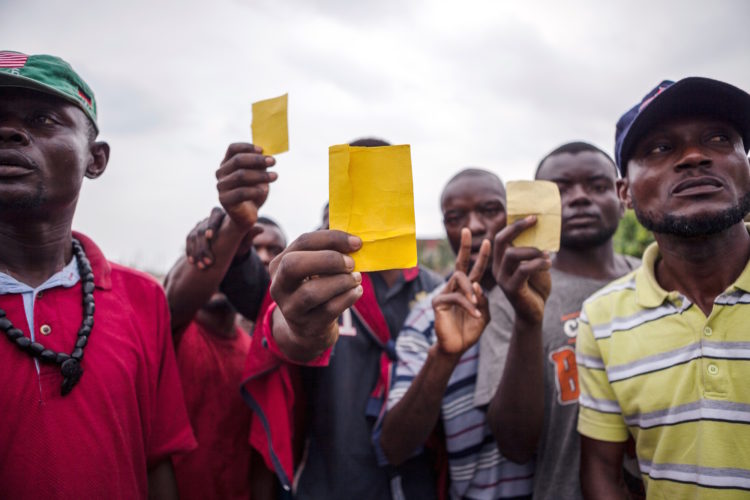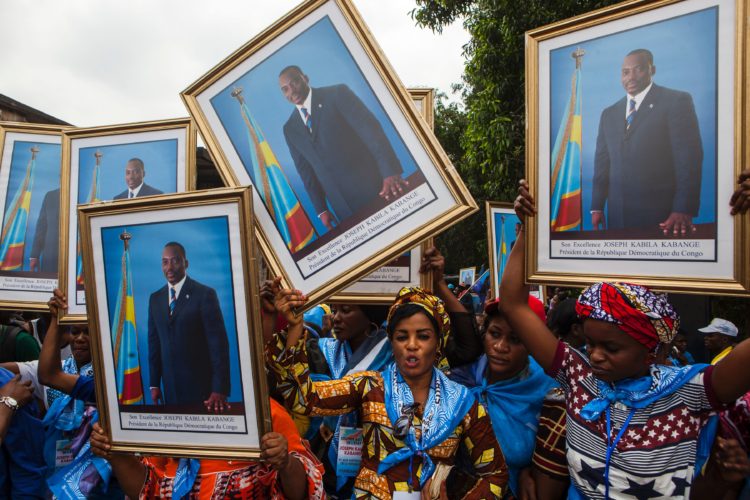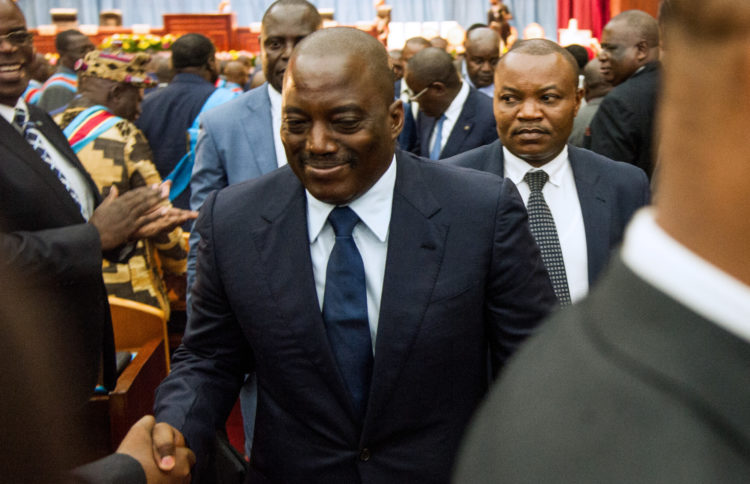Congo is at a critical juncture in its history. Joseph Kabila is coming to the end of his third term and is not allowed to stand again according to the constitution. But the election of November 27, 2016 was delayed for logistical and financial reasons and there seems to be no plan for what will happen next.
The past four months in Congo have been marked by protests. In September 2016, 37 people lost their lives during violence demonstrations, as well as police officers, according to the government. Since those incidents, many have noticed an increase in arbitrary arrests. A national dialogue called by the president in October 2016 to resolve the crisis was boycotted by the vast majority of the opposition, who saw it as a ploy to extend the president’s term.
The international community is not doing much. Senior Human Right Research Ida Sawyer, whose work permit was revoked by the authorities, wrote to the UN Council to warn them about the deteriorating situation. There has been little action since.
And now the opposition and civil societies are planning to go to the streets en masse on the 19 of December to show Kabila the yellow card – to use a football analogy – and they are prepared to hold a series of protests until Kabila relinquishes his power.

Meet Bandoma, Nathalie, Stany, Bienvenue, and Mukoso. These young Congolese activists, artists, marketing and economics graduates aged between 23 and 31 tell us what it’s like to live in an environment characterised by political uncertainty while the spectre of social unrest haunts the vast central African state. Some express strikingly similar aspirations for their country and themselves, and others feel their dreams are not achievable due to bad governance.
We’ll go to the streets and people who are helping him to stay in power are responsible for whatever happens on that day.
Bandoma doesn’t believe the government was unable to organise the election on November 27. ‘It’s a pretext that we can’t accept. The constitution said the government should organise the election 90 days before his term ends. How come they were able to do it in 2006 and 2011? Now in 2016, there’s no money! It’s just an excuse to extend his term in office because he knows he can’t be a candidate anymore.’
Bandoma, 22, is a civil coordinator and member of the pro-democracy youth movement called Filimbi (which means ‘whistle’ in Lingala). He was just seven year old when Kabila became president. Despite random arrests, he persists in trying to raise awareness by distributing leaflets in the boroughs of the capital of the DRC, Kinshasa.
19 décembre 2016 ekoki ! #ByeByeKabila #Telema #RDC pic.twitter.com/k6kEuotSzG
— LUCHA 🇨🇩 (@luchaRDC) December 16, 2016
Filimbi, along with other pro-democracy movements like Lucha, has been organising street protests since early 2015. Congo doesn’t have a big middle class, which makes it harder to organise sustained protest. Most people can’t afford to think beyond their next meal.
Filimbi and Lucha are growing in prominence in and outside Congo, thanks to their tenacity and ability to mobilise the population. ‘It’s an association of young, conscious Congolese,’ Bandoma explains. ‘Anybody can freely say what they think about political and social issues. You just have to share our vision to join. We have offices in some of Congo’s main cities and even Europe as well. We have all kind of people joining us: students, professionals, and ordinary people.’
If he retires gracefully, he will be the first president in the history of Congo to do so.
When asked about December 19, Bandoma reminds me that the ‘Congolese have the right to take destiny into their own hands. Kabila ceased to be president on the 19th of December. The constitution is clear: Article 60 said the president is elected for a five-year term, renewable once. We’ll go to the streets and people who are helping him to stay in power are responsible for whatever happens on that day.’
He also feels that Kabila is missing an opportunity to be on the right side of history: ‘We’ve never had a peaceful transition of power. If he retires gracefully, he will be the first president in the history of Congo to do so. People will remember that. Plus, he will be a senator for life as an ex-head of state.’
A number of African presidents are amending their respective constitutions in an attempt to cling to power. Oppositions to these changes have been primarily domestic, rather than coming from regional or international powers.
Bandoma feels that the Congolese should rise up and assert their rights. ‘It’s deplorable that the presidents of Burundi and Congo have extended their term limit, but you’ve seen what happened in Burkina when people took to the street and in Senegal where youth activist groups like Y’en a Marre (Fed Up) galvanised the population against president Abdoulaye Wade. It’s inspirational. Filimbi has also been very busy raising awareness. Now we are determined to push for change too.’
Bienvenue is also yearning to see someone else at the helm of the country and doesn’t buy the excuses given by the Electoral Commission for postponing the election. ‘They had enough time. The election could have taken place if they wanted. I don’t believe there are logistical problems; what they don’t have is political will, because Kabila wants to stay in power. It’s as simple as that.’
The future of our country is at stake. We want change.
Bienvenue, 30, is an artist. He has a shop located in the centre of Kinshasa. Most of his clients are tourists and Congolese from the diaspora. In recent months, customer numbers have dwindled dramatically due to the crisis. Needless to say, making a living will be challenging if the current stalemate isn’t resolved.
Unlike his Congolese counterpart, Bandoma, Bienvenue is not affiliated with any activist group and doesn’t usually go to street protests. ‘I only go to marches when I feel it’s necessary. It’s the same with most of my friends. Now the future of our country is at stake. We want change.’
The revolutions that happened elsewhere on the continent seemed to have inspired and fuelled him too. Tellingly, he mentions Egypt when asked about December 19. ‘Look, sometimes it’s necessary to have a revolution. The Egyptians had theirs in 2011 and now it’s our turn. We can’t be scared of the military with their guns and tanks; otherwise we would achieve nothing,’ he says defiantly.
As motivated as he is, Bienvenue is not naïve. ‘Revolutions are messy affairs,’ he adds. ‘There’s always a price to pay.’
There’s a hint of apprehension when Bienvenue talks about the future. Fearing a drawn-out battle, he’s hesitant to think beyond December 19. His solution to the recurring ‘third term’ problem in Africa is a change of mind-set.
The more politically aware we are, the harder it will be for them.
‘Lots of African leaders are changing their constitution by force, using silly excuses and fake referendums. They think that they are cleverer than us. People should automatically hit the streets to protest if the head of state starts thinking about changing the constitution without any good reason. The more politically aware we are, the harder it will be for them.’
Bienvenue hopes to see a leader who doesn’t consider himself above the law. ‘I’d love to see leaders who respect the institutions, rules and regulations once they are in charge.’ It may seem a modest wish, but it’s not a surprising one given Congo’s troubled history.
Nathalie received her communication degree last month and she is eager to enter the job market, but recent events don’t fill her with confidence. With the economy almost coming to a halt, she’s likely to join the other millions of Congolese on the unemployment list, which might explain her need to see a new political class. She blames the current administration for the political stalemate. The lack of budget for the 2016 election should have been considered before. It looks like Kabila wants to extend his term in office,’ she says.
Like many Congolese, she’s fearful of what could happen on the 19 December and after. ‘We’re really scared,’ she says, before going on to explain. ‘From a social point of view things are bad already. People are not getting paid, our currency is losing value, and everything is becoming expensive. We also don’t know if the current president is going to stay. We pray and hope to have somebody new. Kabila recently nominated a new prime minister, so we’re going to see how things develop on that front.’
Nathalie bemoans the lack of capable leaders, on the continent and in Congo in particular, with clear visions about how to develop their countries using the abundant resources available. ‘If the president, at his level, doesn’t respect the country’s institutions, then other politicians and people with influence won’t hesitate to adopt the same attitude. The current president has to let somebody else come in and do better than him. If you haven’t been able to accomplish certain things, you should let somebody with fresh ideas come in. If you loved your country you would want another person to come and do what you couldn’t do.’
I want Congo to be an emerging country, developed, evolved, so that people can remain here and contribute to the rebuilding of the country.
‘Congolese are so disheartened by the direction the country is taking. Some are saying that if they ever get the chance to get out of the country, they’ll never come back. They are not happy to be Congolese. I want Congo to be an emerging country, developed, evolved, so that people can remain here and contribute to the rebuilding of the country.’
Mukoso, 30, is the National Secretary of the youth wing of the C.C.U (Covention of United Congolese) the party of the government spokesman, Lambert Mende. He doesn’t agree with the notion that the government is purposely delaying the organisation of the election. ‘Postponing the election isn’t a bad thing. Kabila wants it to happen in normal conditions. When he was elected in 2006 and 2011, some people said the elections were rigged. Now, even though he’s not a candidate, he still wants the best possible conditions for the elections, but people still complain. The electoral commission promised in 2018 that everything will be in place.’
While most people are anxious about the 19th of December, Mukoso is unfazed: ‘Nothing is going to happen on the 19th. Young people are being manipulated by some politicians.
‘As we speak, the government is engaged in direct talks with the opposition to find an agreement to move things forward peacefully.’ The Catholic Church has indeed been mediating direct talks since early December between Kabila’s ruling party and the opposition in a bid to find an agreement. It is seen as the best hope to stop Congo spiralling into fresh unrest.

Mukoso also feels that the pressure the international community is putting on Kabila is unacceptable. ‘We can’t just organise the election because they say so; we will do it once the electoral commission feels that all the conditions have been met. Only they can tell us when the conditions are more appropriate.’
Although he acknowledges that some presidents on the continent do try to extend their term by changing the constitutions, he feels Kabila shouldn’t be put in this category. ‘He doesn’t have the same ideology. He’s never said that he was planning to seek a third term. The constitution forbids him from doing it. On the contrary, he’s meeting up with the opposition to find a way to organise the election in 2018. There are particular sets of circumstances that have forced the electoral commission to postpone the election. You can’t compare Kabila to other presidents.’
Mukoso hopes to see more foreign businessman in Congo. ‘There’s lots of potential in our beautiful, rich country; investors should come and seize the opportunities that exist in various sectors. They’ll get return on their investment and the Congolese people will benefit as well.’
Stany, 30, has a degree in economy and is also trying to find a stable job. Frustrated by the lack of opportunities in Congo, he tried his luck for three years in neighbouring countries before eventually coming back to his homeland. Stany s experiences has shaped his political views. He s also very sceptical about the reasons given by the electoral commission for postponing the election. ‘He started his second term in 2011, so they had plenty of time. If the electoral commission couldn’t get ready during those five years, should I believe that all the financial and logistical issues will be resolved in about a year and a half? They are pushing back the election date on purpose. We were able to have elections in 2006 and 2011. There is a lack of political will.’
Kabila was 29 years old when he became president. Now he’s a multimillionaire.
While he’s pleased that the opposition and the ruling party are involved in direct talks, he warns that the Congolese will still take to the streets on December 19 if the opposition comes to an agreement that doesn’t alleviate their concerns. ‘It is good that both sides are talking directly, but people will not automatically back any political arrangements. Our demands have to be met; we are fed up,’ he says seriously.
"…President Kabila, respect the constitution" urge @MatthewRycroft1 of @UKUN_NewYork: https://t.co/K4gJjr9cBn #KabilaMustGo #ByeByeKabila pic.twitter.com/YYY6kw8ceJ
— Vava #CongoIsBleeding Tampa (@VavaTampa) December 6, 2016
Although Stany is not affiliated with any political party, he feels his aspirations are more aligned with the opposition parties. ‘I’m for the alternation of power. If I want things to change I have to go with one of the parties in the opposition,’ he explains. ‘Currently there’s no social project for young people. I can’t support people who don’t feel sorry for us. Kabila was 29 years old when he became president. Now he’s a multimillionaire. When will young people in Congo have an opportunity to have a stable life?’
When asked about his main hopes, Stany mentions strong institutions and a better future for young Congolese. ‘We want a president who is going to protect the interests of the country, have a good social plan for young people, and respect the constitution. We also need a regular alternation of power to reach our potential.’
After working and travelling abroad, Stany has been struck by the discrepancy in living standards between Congo and other countries in the region.
‘There’s no reason why Congo can’t be as developed as Namibia or Angola. I have been in both countries and it’s clear that they are more advanced than us. I once worked on a temporary basis for a Chinese company in Angola. I was making something like 700 dollars a month. You need to be a director of a company in Congo to have that salary. Opportunities like this should be available in Congo.’

